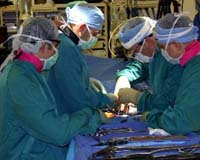 |
Cold Spring NY (SPX) Oct 06, 2010 Radiation therapy is used to treat more than half of all cancer cases, but patient response to therapy can vary greatly. Genetics is increasingly being recognized as a significant contributor to inter-individual response to radiation, but the biology underlying response remains poorly understood. In a study published online in Genome Research, researchers employed a pharmacogenomics approach to find biomarkers associated with radiation response that could help to more effectively tailor individual cancer treatments in the future. Response to radiation treatment can range from complete eradication of the tumor to severe adverse reactions in normal tissues that complicate a patient's recovery. Several clinical factors, such as radiation dose and fraction, are known to influence radiation response, but it has recently been estimated that genetic factors may explain nearly 80% of the inter-individual variation of radiation response in normal tissue. If genetic variants and biological mechanisms contributing to radiation response are identified, more personalized treatment strategies could be employed in the clinic. In this study, researchers led by Liewei Wang of the Mayo Clinic performed a genome-wide association study on 277 ethnically defined human lymphoblastoid cell lines (LCLs) to identify biomarkers for radiation response. Previous studies have found that genetic variation significantly influences gene expression following radiation treatment, however a possible relationship of basal gene expression with radiation response has not been extensively studied until now, and could be key to predicting response. The group integrated several lines of data from the LCLs, including 1.3 million single nucleotide polymorphisms (SNPs), genome-wide gene expression data, and ionizing radiation cytotoxicity phenotypes. By looking for SNPs and gene expression patterns that associate with a radiation response phenotype, Wang's group narrowed down a list of candidate genes associated with radiation treatment response. To functionally validate the biomarkers, the team tested the associations of a set of the candidate genes in three cancer cell lines. The validation experiments confirmed the expression of five genes as involved in radiation-induced response. Wang noted that this work not only identifies biomarkers, but also sets the stage for uncovering novel functions of these genes that could ultimately benefit individual patients. "These studies will provide a foundation for future translational studies to individualize radiation therapy based on the expression of these candidate genes," said Wang, "and may make it possible to design novel combination therapy for selected patients based on these biomarkers to overcome resistance." Scientists from the Mayo Clinic (Rochester, MN) contributed to this study. The manuscript will be published online ahead of print on October 5, 2010. Its full citation is as follows: Niu N, Qin Y, Fridley BL, Hou J, Kalari KR, Zhu M, Wu T, Jenkins GD, Batzler A, Wang L. Radiation pharmacogenomics: A genome-wide association approach to identify radiation response biomarkers using human lymphoblastoid cell lines. Genome Res doi:10.1101/gr.107672.110.
Share This Article With Planet Earth
Related Links Cold Spring Harbor Laboratory Hospital and Medical News at InternDaily.com
 Trials set for body-chilling anaesthesia
Trials set for body-chilling anaesthesiaBoston (UPI) Sep 26, 2010 Medical researchers in the United States say they are poised to begin human trials on a suspended-animation technique for surgery patients. The idea is to use extreme hypothermia to basically shut down the body during emergency trauma surgery, giving doctors more time to work and less need for anesthetics and life-support equipment. Dr Hasan Alam, a leader of the research team fr ... read more |
|
| The content herein, unless otherwise known to be public domain, are Copyright 1995-2010 - SpaceDaily. AFP and UPI Wire Stories are copyright Agence France-Presse and United Press International. ESA Portal Reports are copyright European Space Agency. All NASA sourced material is public domain. Additional copyrights may apply in whole or part to other bona fide parties. Advertising does not imply endorsement,agreement or approval of any opinions, statements or information provided by SpaceDaily on any Web page published or hosted by SpaceDaily. Privacy Statement |